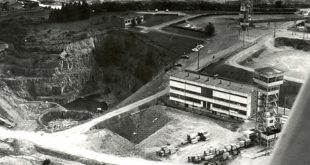During peak pollution events, everyone is talking about them. Fine particles are often accused of being toxic. Unfortunately, they do not only come out during episodes of high pollution. Véronique Riffault, a researcher in atmospheric sciences at IMT Lille Douai, revisits the basics of fine particles to better understand what they are all about. What does a fine particle …
Read More »Search Results for: water
Climate change as seen from space
René Garello, IMT Atlantique – Institut Mines-Télécom The French National Centre for Space Research has recently presented two projects based on greenhouse gas emission monitoring (CO2 and methane) using satellite sensors. The satellites, which are to be launched after 2020, will supplement measures carried out in situ. On a global scale, this is not the first such program to measure climate …
Read More »Invenis: machine learning for non-expert data users
Invenis went into incubation at Station F at the beginning of July, and has since been developing at full throttle. This start-up has managed to make a name for itself in the highly competitive sector of decision support solutions using data analysis. Its strength? Providing easy-to-use software aimed at non-expert users, which processes data using efficient machine learning algorithms. …
Read More »Understanding methane hydrate formation to revolutionize pipelines
Since hydrocarbon is always drawn from deep in the sea floor, oil companies face potential obstruction problems in their pipelines due to the formation of solid compounds: methane hydrates. Ana Cameirao, an engineer and PhD specializing in industrial crystallization at Mines Saint-Étienne, is hoping to understand and model this phenomenon. She has contributed to the creation of an industrial chair in …
Read More »GreenTropism, the start-up making matter interact with light
The start-up GreenTropism, specialists in spectroscopy, won an interest-free loan from the Fondation Mines-Télécom last June. It hopes to use this to reinforce its R&D and develop its sales team. Its technology is based on automatic learning and is intended for both industrial and academic use, offering application perspectives ranging from the environment to the IoT. Is your sweater …
Read More »What is renewable energy storage?
The storage of green energy is an issue which concerns many sectors, whether for energy transition or for supplying power to connected objects using batteries. Thierry Djenizian, a researcher at Mines Saint-Étienne, explains the main problems to us, focusing in particular on how electrochemical storage systems work. Why is the storage of renewable sources of energy (RSE) important today? …
Read More »New Caledonia: a mine challenging democracy
When an industrial mining complex wanted to release a pollutant into their lagoon in the late 1990s, the inhabitants of the southern province of Grande Terre took action. In their fight against the environmental and cultural danger, the citizens found it difficult to make their voices heard. Today, almost 20 years have passed since the scientific and social controversy first …
Read More »Dam-break phenomenon in optical fibers
Last May, for the first time, researchers from the University of Lille and IMT Lille-Douai exposed a photon dam breaking in an optical fiber. These results provided the experimental confirmation for an old theory that dates back over 50 years. Above all, this research reveals a surprising analogy with a water dam break, creating the prospect of collaboration between physicists …
Read More »Trust, a tool for reducing technological risks?
This article is part of our series on trust, published on the occasion of the release of the Fondation Mines-Télécom brochure: “The new balances of trust: between algorithms and social contract.” A sociologist with IMT Atlantique, Sophie Bretesché is specialized in the risks associated with technology. She has worked extensively on the issue of redeveloping former uranium mines in mainland France. …
Read More »Fine particulate pollution: can we trust microsensor readings?
Nathalie Redon, IMT Lille Douai – Institut Mines-Télécom Last May, Paris City Hall launched “Pollutrack”: a fleet of micro sensors placed on the roofs of vehicles traveling throughout the capital to measure the amount of fine particles present in the air in real-time. A year before, Rennes proposed that residents participate in assessing the air quality via individual sensors. In France, for several …
Read More » I'MTech L'actualité scientifique et technologique de l'IMT
I'MTech L'actualité scientifique et technologique de l'IMT









